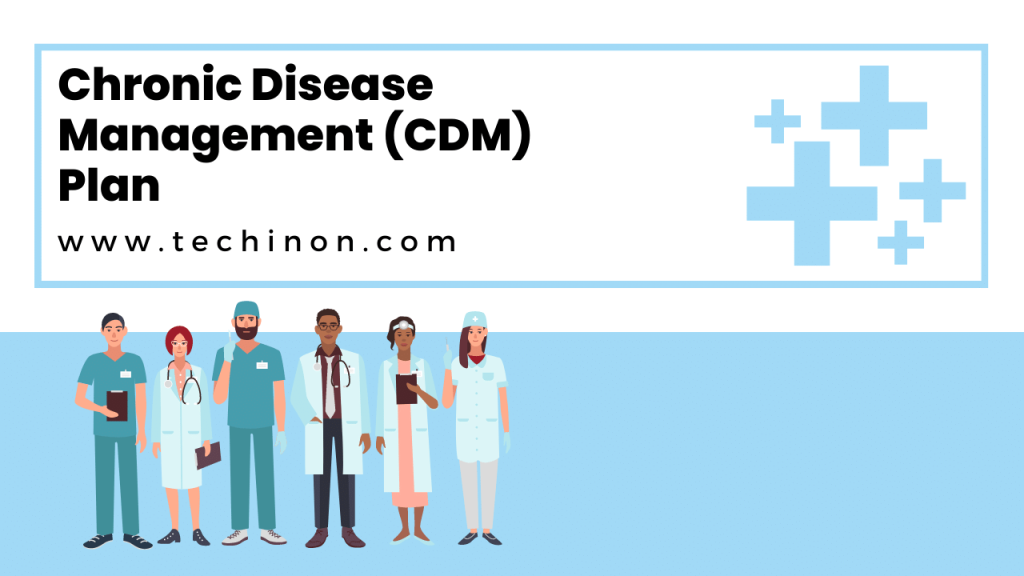In an era where chronic diseases have become increasingly prevalent, a well-crafted Chronic Disease Management (CDM) Plan stands as the lighthouse in the stormy sea of ongoing health concerns. A well-structured plan not only helps to manage chronic illnesses but also empowers individuals to live healthier, more fulfilling lives.
What is a Chronic Disease Management Plan?

In its essence, a chronic disease management plan is a personalized, patient-centered blueprint developed by healthcare providers to manage long-term health conditions effectively. These strategic plans help navigate the complexities of chronic illnesses such as diabetes, heart disease, cancer, and more. They emphasize multidisciplinary care, proactive monitoring, lifestyle modifications, and empowering patients to manage their health proactively.
How to Develop an Effective Chronic Disease Management Plan?
Creating an effective chronic disease management plan involves a holistic approach, a team of healthcare professionals, and a deep understanding of the patient’s unique circumstances. A successful plan typically includes:
- Diagnosis and Risk Assessment: Detailed evaluation of the disease, patient’s health condition, lifestyle, and potential risk factors.
- Goal Setting: Define health objectives aligning with the patient’s needs, capabilities, and preferences.
- Action Plan: A comprehensive, step-by-step plan of action integrating medication schedules, diet plans, exercise regimens, regular check-ups, and more.
- Patient Education and Empowerment: Guiding patients to understand their condition, management strategies, and encouraging them to be actively involved in their care.
- Regular Monitoring and Evaluation: Routine follow-ups to track progress, evaluate effectiveness, and modify the plan as needed.
- Support Network: Engaging family, caregivers, and support groups to foster a conducive environment for disease management.
Role of Healthcare Providers in Chronic Disease Management Plans

Healthcare providers play a pivotal role in chronic disease management plans, acting as the captains who steer the ship. They offer expertise, devise the strategy, provide medical treatment, conduct regular health evaluations, offer support, and play a crucial role in patient education. A multidisciplinary team of healthcare professionals collaboratively work to create and implement a comprehensive chronic disease management plan, ensuring all aspects of a patient’s health are covered.
Impact of Technology on Chronic Disease Management Plans
In the digital age, technology has become an invaluable ally in chronic disease management. It not only enhances access to healthcare but also supports personalized, real-time monitoring, and interaction. Technologies such as telemedicine, digital health records, mobile health apps, wearable devices, and AI-driven tools significantly bolster the effectiveness of chronic disease management plans. They allow patients and healthcare providers to monitor progress closely, adhere to medication schedules, and make necessary adjustments swiftly and efficiently.
Transformative Benefits of a Chronic Disease Management Plan
Chronic disease management plans bring an array of transformative benefits to patients’ lives. They improve overall health outcomes, enhance quality of life, empower patients, and help to prevent the escalation of chronic conditions. By fostering proactive, personalized care, these plans enable patients to take charge of their health and find a balanced, healthier path even amid the challenges of chronic diseases.
Power of Self-Management in Chronic Diseases
One of the fundamental pillars of a chronic disease management plan is the empowerment of patients to manage their health. Self-management strategies include adherence to medication schedules, regular exercise, healthy diet, stress management, and regular health check-ups. Empowered with knowledge and guidance, patients become active participants in their health journey, contributing significantly to the effectiveness of their chronic disease management plan.
Chronic diseases can pose significant challenges, but a meticulously crafted chronic disease management plan can be a game-changer. It offers a strategic roadmap to manage health conditions, empowers individuals to take control of their health, and sets them on a journey to a healthier, more vibrant life. Mastering long-term health begins with a chronic disease management plan – the beacon of hope in the fight against chronic diseases.
The Role of Lifestyle Modifications
The impact of lifestyle on health cannot be underestimated, particularly in managing chronic diseases. A comprehensive chronic disease management plan thus integrates lifestyle modifications into its strategy, targeting key areas like nutrition, physical activity, stress management, and sleep hygiene.
A nutritious, balanced diet is often the first line of defense in combating chronic diseases. Personalized meal plans that prioritize whole foods, lean proteins, fruits, vegetables, and whole grains can significantly improve health outcomes.
Physical activity, on the other hand, is a potent weapon against chronic illnesses. Regular exercise can help manage weight, lower blood pressure, improve cardiovascular health, and boost mental well-being.
Stress management techniques like mindfulness, yoga, meditation, and relaxation exercises are incorporated into the chronic disease management plan to help individuals deal with the psychological aspects of living with a chronic disease.
Adequate and quality sleep is a vital yet often overlooked component of chronic disease management. Sleep deprivation can exacerbate chronic diseases and impede recovery. As such, ensuring good sleep hygiene forms a critical part of any comprehensive chronic disease management plan.
Medication Adherence in Chronic Disease Management Plans
A critical aspect of a chronic disease management plan is medication adherence—consistently taking prescribed medication at the correct dose and at the right time. Mismanagement of medication can lead to worsening symptoms, hospitalization, and even death in severe cases.
Healthcare providers play an essential role in educating patients about the importance of medication adherence. They clarify doubts, address concerns about side effects, and provide strategies to manage medication schedules effectively.
Innovative technologies like pill reminders, electronic pill dispensers, and medication management apps have also made it easier for patients to adhere to their medication regimes, further enhancing the effectiveness of chronic disease management plans.
How Family and Caregivers Contribute to a Chronic Disease Management Plan
The role of family members and caregivers in managing chronic disease is invaluable. They offer emotional support, assist with daily activities, help monitor symptoms, encourage medication adherence, and accompany patients to appointments.
Their involvement can significantly enhance the effectiveness of a chronic disease management plan, providing a supportive environment that encourages and enables patients to follow through with the plan. Emotional support from family and caregivers also plays a significant role in coping with the psychological aspects of chronic illness, which is often a key factor in successful disease management.
Tools and Resources for Chronic Disease Management
There are an array of tools and resources available today that make chronic disease management more manageable and efficient. These include:
Mobile health apps and online portals that offer a wealth of information on managing chronic diseases, along with tools to track progress, set reminders for medication and appointments, and even connect with healthcare providers virtually.
Wearable technology and health monitoring devices that enable real-time tracking of vital signs, physical activity, and other health metrics.
Patient support groups and online communities provide a platform for individuals to share experiences, learn from others, and find emotional support.
Telemedicine services have made it possible to access healthcare services from the comfort of one’s home, making regular follow-ups and consultations more convenient.
Also Read: Which Best Explains How Contractionary Policies Can Hamper Economic Growth?
Conclusion
In conclusion, Chronic Disease Management (CDM) Plans herald a transformative shift in the way we approach and manage long-term health conditions. By empowering patients, leveraging technology, and promoting a comprehensive, multidisciplinary approach, these plans hold the key to mastering long-term health and living fuller, healthier lives in the face of chronic diseases. With such a plan in place, you are not just surviving, but thriving, in your journey of health and wellness.
Iva Ort is an ingenious wordsmith and captivating blogger whose tales leap off the screen and into your imagination. With a pen as her wand, she weaves enchanting stories and insightful articles, leaving readers spellbound and craving more.

